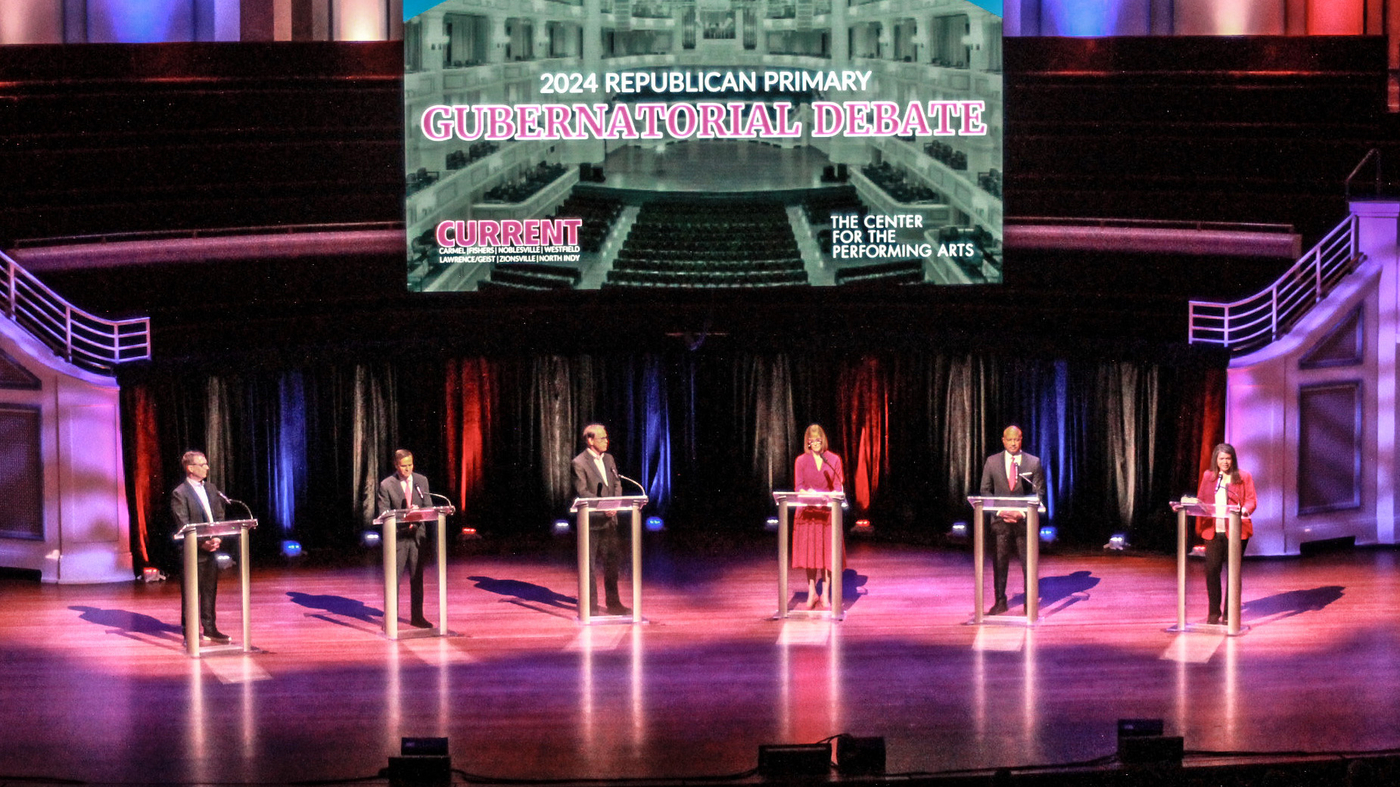
[ad_1]

GOP Indiana gubernatorial candidates Mike Braun, Brad Chambers, Suzanne Crouch, Eric Doden, Curtis Hill and Jamie Reitenour debate during a forum on March 11, 2024.
Brandon Smith/IPB News
hide caption
toggle caption
Brandon Smith/IPB News

GOP Indiana gubernatorial candidates Mike Braun, Brad Chambers, Suzanne Crouch, Eric Doden, Curtis Hill and Jamie Reitenour debate during a forum on March 11, 2024.
Brandon Smith/IPB News
Six Republicans are vying to be the Republican nominee for governor in Indiana with GOP Gov. Eric Holcomb term-limited after eight years in office.
But Holcomb isn’t endorsing anyone in the race — even though the field includes his running mate and governing partner, Lt. Gov. Suzanne Crouch.
Holcomb first started getting questions about an endorsement a year and a half ago. But he resisted, at first acknowledging that Crouch needed to be her own candidate.
“I don’t want anyone thinking that just because she and I work so closely together that she’s a clone of me,” Holcomb said.
The winner of the primary election on May 7 will face former Indiana Superintendent of Public Instruction Jennifer McCormick, the only Democratic candidate.
Despite Holcomb’s solid approval rating from Indiana voters, it’s a little different in the Republican base. The right wing’s anger is focused primarily on Holcomb’s policies trying to combat COVID-19.
Crouch has been happy to distance herself on that issue.
“We can’t go back and change what happened,” Crouch said. “But I’ve learned from the mistakes of our top executive.”

Indiana Lt. Governor Suzanne Crouch
Brandon Smith/IPB News
hide caption
toggle caption
Brandon Smith/IPB News

Indiana Lt. Governor Suzanne Crouch
Brandon Smith/IPB News
But she doesn’t shy away from her resume, which includes decades of elected office. Crouch served in county government, eight years in the state House of Representatives and three years as state auditor.
In one of the primary’s debates, a moderator asked her why so many of the candidates try to claim they’re the outsider in the race.
“How can anyone in this primary claim to be an outsider?” WISH-TV anchor Phil Sanchez asked.
“I don’t know,” Crouch replied, prompting laughter from the live audience. “But you know, I’m proud of my public service.”
So, is it awkward that her previous running mate hasn’t backed her?
Mike O’Brien, who has worked in Indiana politics for more than two decades and ran Holcomb’s 2016 campaign, said the governor doesn’t want to risk hurting her with an endorsement.
“You’ve got four perfectly legitimate candidates here,” said O’Brien, who is also informally advising Crouch. “Any one of them can serve in the role as governor. Let’s just let that play itself out.”
So, if a Holcomb endorsement isn’t driving this race, what is? Perhaps another endorsement: former President Donald Trump, who jumped in early to back Indiana Republican U.S. Sen. Mike Braun.
Though Braun has spent more than a decade in elected office — from local school board to state legislator to U.S. senator — the auto parts business he ran for 37 years is his campaign’s primary talking point. Braun has long used his private sector experience to link himself to Trump.
“He is the guy that broke the system at the federal level and now the system is trying to take him out,” Braun said. “So, if you want to know who the outsider is, that’s very clear — and I represent that here.”
O’Brien said that’s a huge factor in a state Trump won by 16 percentage points in 2020.
“Maybe the simple analysis is the right one,” O’Brien said. “And that is, Trump endorsed Mike Braun. He started out with the most name I.D. and a lot of money, and that’s all it really is going to take right now in the context of a Republican primary.”
A lot of money is putting it mildly. The six Republicans will spend around $40 million by Election Day, a record for campaign spending in an Indiana primary.

GOP U.S. Sen. Mike Braun
Brandon Smith/IPB News
hide caption
toggle caption
Brandon Smith/IPB News

GOP U.S. Sen. Mike Braun
Brandon Smith/IPB News
Braun spent $6 million alone in just the first three months of the year.
Three of his opponents — Crouch, former state commerce secretary Brad Chambers and former state economic development chief Eric Doden — spent $14 million combined.
The bulk of that has blanketed Indiana’s airwaves with campaign ads.
University of Indianapolis Associate Professor of Political Science Laura Merrifield Wilson said all that spending likely ends up helping Braun.
“The benefit that Braun has in this particular primary is the fact that there are several other candidates that really seem to split the electorate,” Wilson said.
In the race’s limited public polling, Braun has led his next closest opponent — Crouch — by 20 to 30 points each time. Chambers and Doden are close to Crouch, while former state Attorney General Curtis Hill and religious conservative Jamie Reitenour trail further behind, in the lower single digits.
But Wilson noted the number of voters in those polls who say they’re undecided is between around 20 to 40 percent, which she said is why there’s still so much money being spent.
“I think there is still that hope,” Wilson said. “And we recognize in a gubernatorial primary, probably up until Election Day, you’re going to have at least a portion of undecided voters.”
Besides, Wilson said, there little worry about saving the money for the general election. Indiana hasn’t elected a Democrat to any statewide office in 12 years — so the next governor will likely be decided on May 7.
[ad_2]